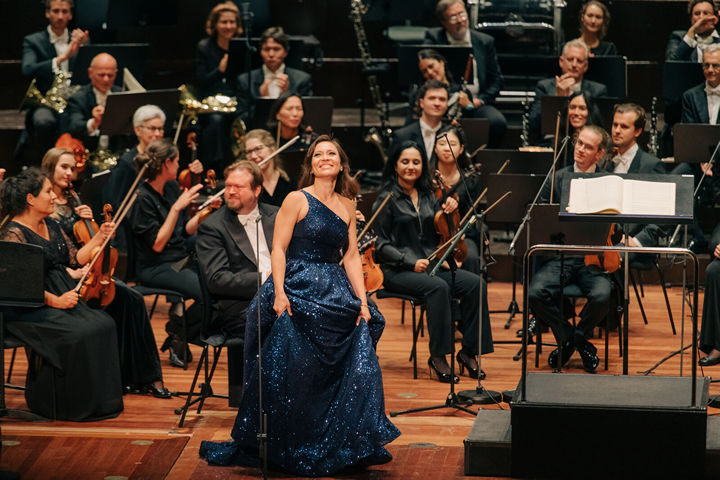| Opera Reviews | 3 May 2024 |
A classy performance with textures and contrasts throughoutby Catriona Graham |
|
Wagner: Tannhäuser |
|
 |
|
|
This year’s Wagner at the Edinburgh International Festival was a concert performance by the Deutsche Oper Berlin of Tannhäuser, conducted by Sir Donald Runnicles. The overture sets the scene in more ways than one – the themes which will recur and the really classy playing. It is followed by the entrance of Venus (Irene Roberts) in a very glamourous, glittering gown of dark sapphire blue. It is the only splash of visual colour in the otherwise monochrome evening. Any other colours come out of the instruments and voices. She is neither entreating or charming the minstrel Tannhäuser to stay, rather commanding him. Nevertheless, memories of the world outside the Venusberg have intruded, and he must go, albeit under a curse of only being able to praise Venus. Clay Hilley, singing from the book, sets off, hearing on the way Meechot Marrero’s Young Shepherd rejoicing in May, before he encounters a hunting party of all his former mates, including the minstrels Wolfram von Eschenbach and Walter von der Vogelweide. Welcomed back into the fold by them and, in turn, the Landgrave Hermann (Albert Pesendorfer), he cannot escape the curse and, having broken the heart of Elisabeth is banished, sent to Rome to seek absolution. When he returns, thinking himself unabsolved, it is in time to throw himself on her coffin. It seems even Heldentenors can be upstaged by baritones. Thomas Lehman’s Wolfram is a far more sympathetic character than Heinrich Tannhäuser. His love both for Elisabeth and his friend Tannhäuser shines through his singing whereas Attilio Glaser’s Walter seems a more detached friend. But then Tannhäuser is a bit full of himself for most of the opera, thus presenting Hilley with the task of making the audience care what happens to him. Pesendorfer’s Hermann is conscious of his care both for his niece and the general well-being of the household and valley, conveyed in the warmth of his bass. As Elisabeth, Emma Bell’s voice is full of excitement when she realises that Tannhäuser has returned from far distant lands (aka the Venusberg). Her singing is rock-solid, not least when floating above the other parts and chorus in the grand Act II ensemble. And then there is the chorus; splendid throughout, their singing of the Pilgrim’s Chorus in Act III is stunning in its dynamic range. Building slowly from an unaccompanied distant murmur to a roof-lifting fortissimo with full orchestra, it is awe-inspiring and infectious, sending quite a few of the audience singing on their way home. The (to 21st century ears) rather schmaltzy-sounding O du, mein holder Abendstern is sung with fervour by Lehmann, while the orchestra play with taste and precision. Runnicles conjures textures and contrasts galore throughout this performance, including the off-stage band in Act II, comprising players from the RSNO (who didn’t get to take a bow, nor did the 6 trumpeters announcing the arrival of the nobles for the song contest). Venus’s late return to summon Tannhäuser back to the Venusberg is thwarted by Wolfram, who thinks he is saving him from certain damnation, thus demonstrating that though the tenor is the star and centre-stage, it is the baritone who is the true hero. |
|
Photo © Mihaela Bodlovic |
|







